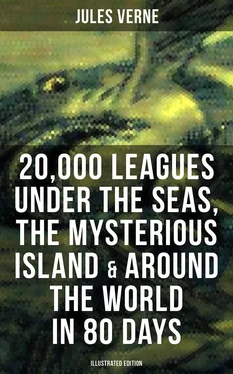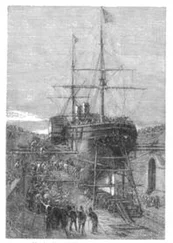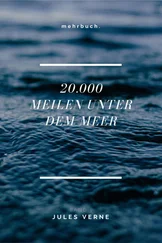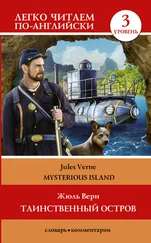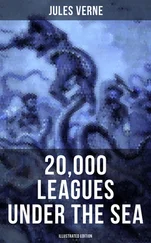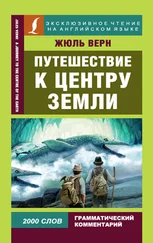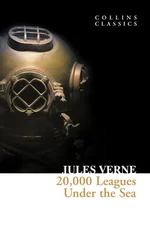“Our friend Ned grows disturbing,” Conseil replied.
“Whatever it is,” Ned Land went on, “any animal having four feet without feathers, or two feet with feathers, will be greeted by my very own one-gun salute.”
“Oh good!” I replied. “The reckless Mr. Land is at it again!”
“Don’t worry, Professor Aronnax, just keep rowing!” the Canadian replied. “I only need twenty-five minutes to serve you one of my own special creations.”
By 8:30 the Nautilus’s skiff had just run gently aground on a sandy strand, after successfully clearing the ring of coral that surrounds Gueboroa Island.
CHAPTER 21
Some Days Ashore
Table of Contents
STEPPING ASHORE had an exhilarating effect on me. Ned Land tested the soil with his foot, as if he were laying claim to it. Yet it had been only two months since we had become, as Captain Nemo expressed it, “passengers on the Nautilus,” in other words, the literal prisoners of its commander.
In a few minutes we were a gunshot away from the coast. The soil was almost entirely madreporic, but certain dry stream beds were strewn with granite rubble, proving that this island was of primordial origin. The entire horizon was hidden behind a curtain of wonderful forests. Enormous trees, sometimes as high as 200 feet, were linked to each other by garlands of tropical creepers, genuine natural hammocks that swayed in a mild breeze. There were mimosas, banyan trees, beefwood, teakwood, hibiscus, screw pines, palm trees, all mingling in wild profusion; and beneath the shade of their green canopies, at the feet of their gigantic trunks, there grew orchids, leguminous plants, and ferns.
Meanwhile, ignoring all these fine specimens of Papuan flora, the Canadian passed up the decorative in favor of the functional. He spotted a coconut palm, beat down some of its fruit, broke them open, and we drank their milk and ate their meat with a pleasure that was a protest against our standard fare on the Nautilus.
“Excellent!” Ned Land said.
“Exquisite!” Conseil replied.
“And I don’t think,” the Canadian said, “that your Nemo would object to us stashing a cargo of coconuts aboard his vessel?”
“I imagine not,” I replied, “but he won’t want to sample them.”
“Too bad for him!” Conseil said.
“And plenty good for us!” Ned Land shot back. “There’ll be more left over!”
“A word of caution, Mr. Land,” I told the harpooner, who was about to ravage another coconut palm. “Coconuts are admirable things, but before we stuff the skiff with them, it would be wise to find out whether this island offers other substances just as useful. Some fresh vegetables would be well received in the Nautilus’s pantry.”
“Master is right,” Conseil replied, “and I propose that we set aside three places in our longboat: one for fruit, another for vegetables, and a third for venison, of which I still haven’t glimpsed the tiniest specimen.”
“Don’t give up so easily, Conseil,” the Canadian replied.
“So let’s continue our excursion,” I went on, “but keep a sharp lookout. This island seems uninhabited, but it still might harbor certain individuals who aren’t so finicky about the sort of game they eat!”
“Hee hee!” Ned put in, with a meaningful movement of his jaws.
“Ned! Oh horrors!” Conseil exclaimed.
“Ye gods,” the Canadian shot back, “I’m starting to appreciate the charms of cannibalism!”
“Ned, Ned! Don’t say that!” Conseil answered. “You a cannibal? Why, I’ll no longer be safe next to you, I who share your cabin! Does this mean I’ll wake up half devoured one fine day?”
“I’m awfully fond of you, Conseil my friend, but not enough to eat you when there’s better food around.”
“Then I daren’t delay,” Conseil replied. “The hunt is on! We absolutely must bag some game to placate this man-eater, or one of these mornings master won’t find enough pieces of his manservant to serve him.”
While exchanging this chitchat, we entered beneath the dark canopies of the forest, and for two hours we explored it in every direction.
We couldn’t have been luckier in our search for edible vegetation, and some of the most useful produce in the tropical zones supplied us with a valuable foodstuff missing on board.
I mean the breadfruit tree, which is quite abundant on Gueboroa Island, and there I chiefly noted the seedless variety that in Malaysia is called “rima.”
This tree is distinguished from other trees by a straight trunk forty feet high. To the naturalist’s eye, its gracefully rounded crown, formed of big multilobed leaves, was enough to denote the artocarpus that has been so successfully transplanted to the Mascarene Islands east of
Madagascar. From its mass of greenery, huge globular fruit stood out, a decimeter wide and furnished on the outside with creases that assumed a hexangular pattern. It’s a handy plant that nature gives to regions lacking in wheat; without needing to be cultivated, it bears fruit eight months out of the year.
Ned Land was on familiar terms with this fruit. He had already eaten it on his many voyages and knew how to cook its edible substance. So the very sight of it aroused his appetite, and he couldn’t control himself.
“Sir,” he told me, “I’ll die if I don’t sample a little breadfruit pasta!”
“Sample some, Ned my friend, sample all you like. We’re here to conduct experiments, let’s conduct them.”
“It won’t take a minute,” the Canadian replied.
Equipped with a magnifying glass, he lit a fire of deadwood that was soon crackling merrily. Meanwhile Conseil and I selected the finest artocarpus fruit. Some still weren’t ripe enough, and their thick skins covered white, slightly fibrous pulps. But a great many others were yellowish and gelatinous, just begging to be picked.
This fruit contained no pits. Conseil brought a dozen of them to Ned Land, who cut them into thick slices and placed them over a fire of live coals, all the while repeating:
“You’ll see, sir, how tasty this bread is!”
“Especially since we’ve gone without baked goods for so long,” Conseil said.
“It’s more than just bread,” the Canadian added. “It’s a dainty pastry. You’ve never eaten any, sir?”
“No, Ned.”
“All right, get ready for something downright delectable! If you don’t come back for seconds, I’m no longer the King of Harpooners!”
After a few minutes, the parts of the fruit exposed to the fire were completely toasted. On the inside there appeared some white pasta, a sort of soft bread center whose flavor reminded me of artichoke.
This bread was excellent, I must admit, and I ate it with great pleasure.
“Unfortunately,” I said, “this pasta won’t stay fresh, so it seems pointless to make a supply for on board.”
“By thunder, sir!” Ned Land exclaimed. “There you go, talking like a naturalist, but meantime I’ll be acting like a baker! Conseil, harvest some of this fruit to take with us when we go back.”
“And how will you prepare it?” I asked the Canadian.
“I’ll make a fermented batter from its pulp that’ll keep indefinitely without spoiling. When I want some, I’ll just cook it in the galley on board—it’ll have a slightly tart flavor, but you’ll find it excellent.”
“So, Mr. Ned, I see that this bread is all we need—”
“Not quite, professor,” the Canadian replied. “We need some fruit to go with it, or at least some vegetables.”
“Then let’s look for fruit and vegetables.”
When our breadfruit harvesting was done, we took to the trail to complete this “dry-land dinner.”
We didn’t search in vain, and near noontime we had an ample supply of bananas. This delicious produce from the Torrid Zones ripens all year round, and Malaysians, who give them the name “pisang,” eat them without bothering to cook them. In addition to bananas, we gathered some enormous jackfruit with a very tangy flavor, some tasty mangoes, and some pineapples of unbelievable size. But this foraging took up a good deal of our time, which, even so, we had no cause to regret.
Читать дальше
